Addicted to Anne Boleyn
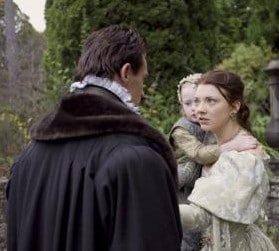
There is something about Anne Boleyn that still fascinates us and inspires us today, more than 500 years after her birth. On this page you will find articles written by Anne Boleyn Files visitors about Anne and you can also read some poetry written about Anne if you click here.
Anne Boleyn Articles
As part of The Anne Boleyn Files “Anne Boleyn Day”, I ran an article competition. Entrants had to write an article on why Anne Boleyn still fascinates people today. Here are the entries, starting with the winning article by Emma:-
“Remember me when you do pray
That hope doth lead from day to day”
These words were penned by Anne Boleyn in a Books of Hours which is now located at Hever Castle. How poignant and almost eerie the words seem now. Could Anne have imagined that people almost 500 years later would still find her as fascinating as Henry did? Surely not, but this verse – along with “le temps viendra” (the time will come) written in another book – show that she had every intention of being a force to reckon with, a person who would not fade from memory. How is it that she has maintained her status as one of history’s most interesting women?
 Firstly, her character was deep and complex. Although her most commonly referenced traits are her sharp temper and ambition, true history lovers know that is only scratching the surface. In the last ten years of her life, during her highest and lowest moments, every angle of that character was exposed. She was demanding yet giving, strict but playful, a woman who could not be controlled or crossed.
Firstly, her character was deep and complex. Although her most commonly referenced traits are her sharp temper and ambition, true history lovers know that is only scratching the surface. In the last ten years of her life, during her highest and lowest moments, every angle of that character was exposed. She was demanding yet giving, strict but playful, a woman who could not be controlled or crossed.
In the end, stripped of her title and honor, it was her immense courage which carried her through those dark, final hours. Who among us cannot be inspired by that? Some sources portray Anne as a victim, some portray her as a villain, but the truth is that she was human. Her story may have been larger than life as a queen, but at the core she was not much different than any other woman: a wife, a mother, a daughter, a sister. She saw joy and heartbreak, tragedy and triumph. We try to imagine the emotions she felt, perhaps finding a bit of her in ourselves, and this realism binds us to her even today.
Another fascinating aspect of Anne’s story is her physical appearance. Even in the present, unfortunately, judgment of women is frequently based on looks. Despite not having a firm likeness of her, we know from contemporary accounts and varied portraits that while she was attractive in an exotic way, she was not beautiful to the typical standard. Henry was not in love with Anne because of something as superficial as beauty – he was captivated by her grace, wit, intelligence and poise. She was proof of how far women can go by using her brain… how refreshing and empowering!
Ultimately, the answer to the question of why Anne is so fascinating revolves back to the question itself. Why?… We simply don’t know. So much about the time period is unknown and will remain unknown. We can’t be certain what Anne looked like, or precisely when her relationship with Henry began, and when it first began to unravel. Even the year of her birth is a subject for disagreement among historians. Centuries of debate and research has not answered all, and thus her story did not end with the stroke of a sword. We continue to learn and question, year after year, pausing on May 19th to honor a woman who is still a great mystery.
Little could Anne Boleyn have known how many lives she would impact – not just her contemporaries, but for centuries to come. The approximate ten years she spent in the public eye is but a small blip on the historical radar, yet she is one of the most popular, controversial figures of all time.
Anne was a woman before her time, a woman who dared to step outside the boundaries set by the men who ruled. When she jotted down the lines in that Book of Hours, she could not have foreseen just how much people would indeed remember her. And perhaps that is her legacy, along with her daughter Elizabeth I. Henry put out that bright flame, but it has continued to burn for 473 years in the hearts of those of us who admire her so greatly. She gives us pride, and courage, and indeed when we remember her – we find hope.
By Emma
Here is an excellent entry from one of Anne’s teenage fans, Ana Sofía:-
“Why people –especially women- admire Anne Boleyn”
Anne Boleyn, or as the title she held, Queen Anne Boleyn, is one of the most important figures in all time of British history. Her existence was of such relevance because she was the object of transition from the Catholic Church to the Anglicans in England, but also because she was a non-royal woman who besotted the king of England and his court. Anne in her early years must’ve day-dreamed about her future and her ambitions, but never imagined how high her star would rise.
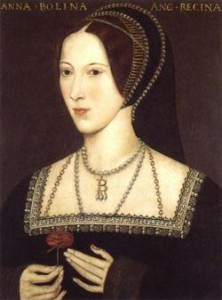 Anne, like most teenagers my age, must have spent some time planning and imagining what she wanted to have in her life. Power, wealth and position in society were topics most likely greatly appealing to her. Because of the time era she was born in and the disadvantages of being a woman, marriage was definitely the way to achieve them. She knew she was worthy enough to make her own way and land a good husband with a title and wealth. As for the Boleyn family’s ambitions, they must have seen Anne as quite a card to play because of her wit, charm and skills.
Anne, like most teenagers my age, must have spent some time planning and imagining what she wanted to have in her life. Power, wealth and position in society were topics most likely greatly appealing to her. Because of the time era she was born in and the disadvantages of being a woman, marriage was definitely the way to achieve them. She knew she was worthy enough to make her own way and land a good husband with a title and wealth. As for the Boleyn family’s ambitions, they must have seen Anne as quite a card to play because of her wit, charm and skills.
After the failed betrothal to the earl of Northumberland, Henry Percy, Anne gave up her love for him and her hope to be the wife of an earl. But she became aware of Henry’s interest in her so she took a chance and decided to try for the crown of England. And so, she didn’t give in to become to his mistress. She somehow managed to maintain the king’s attention for seven years –not with the use of witchcraft but her own resources. And she eventually succeeded, becoming Queen of England.
She is very appealing to us nowadays because she was a courageous and intelligent woman who believed in herself and in her own value. Some regard her as a feminist figure because she fought for what she wanted. I believe some admire her for just being a commoner and how high she rose, for others like me she’s like an inspiration, to let nothing keep us from dreaming. I speak for girls my age who know her story. She encourages us women to believe in ourselves and to use our own resources, virtues and skills to get what we desire in our life.
By Ana Sofía
Kimberly Eve, a writer who is writing her very first novel inspired by Anne Boleyn, wrote the following top quality article:-
Anne Boleyn Thye Most Happy
I firmly believe Anne Boleyn stood out to Henry VIII not only for her rumoured beauty but because she was unlike any British born woman he had ever met. This is partly the reason why she is still being talked about to this day.
During her adolescent years, Anne Boleyn was groomed and educated in the Netherlands and France by three very influential women: Archduchess Margaret of Austria, Henry VIII’s sister, Margaret Tudor, who was betrothed to French King Louis XII of France, and Queen Claude of France. She served as a maid of honour or junior attendant but not yet a lady-in-waiting. By the time she returned to England and met Henry VIII she was every bit a French Lady.
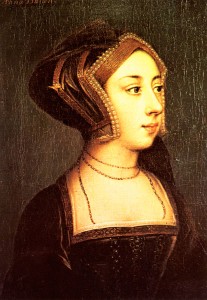 She was a walking, talking contradiction of what a Sixteenth Century woman was supposed to be. She was up on the latest politics of the day and had no qualms about taking part in political debates with both sexes no matter their status. She was very well read and often took it upon herself to recommend the religious books of the day to her husband, King Henry VIII, when she felt her influence was needed without being viewed as a threat given that they practiced separate religions i.e. Henry was a staunch Protestant and Anne was a staunch Catholic.
She was a walking, talking contradiction of what a Sixteenth Century woman was supposed to be. She was up on the latest politics of the day and had no qualms about taking part in political debates with both sexes no matter their status. She was very well read and often took it upon herself to recommend the religious books of the day to her husband, King Henry VIII, when she felt her influence was needed without being viewed as a threat given that they practiced separate religions i.e. Henry was a staunch Protestant and Anne was a staunch Catholic.
Although, she knew her place, she rarely kept silent. Standing her ground and not backing down on the important issues of the day. Her influence was strongly felt amongst Henry VIII’s Privy Council during their courtship as well as during their short lived marriage which was the beginning of her downfall.
We are still so addicted to this woman who lived over four hundred years ago because she is forever shrouded in mystery. There are so many unanswered questions concerning her life and the turbulent times in which she lived that she has become an enigma; serving as a touchstone for every student freshly discovering her for the very first time whether it be within the pages of a book, a class lecture, a painting hanging in a museum, a movie or a popular Showtime Television Show!
Everyone believes they can figure out the pieces to the puzzle and come up with the answers to the questions that history has left us but the truth is we will never know who she really was, why she truly married Henry VIII, or how much British history would have been altered forever had she been blessed enough to give birth to a son in addition to her only daughter Elizabeth I who became one of the longest reigning queens of England.
No matter what is said about Anne Boleyn she left one of the greatest legacies a woman could leave and that is her daughter Elizabeth.
by Kimberly Eve
Our next wonderful entry is by RobertaPhilbrick:-
Anne Boleyn…Her Worldly Attraction
People have been attracted to the story of Anne Boleyn and her life with King Henry VIII for centuries…I believe the draw is because she was an “empowering” woman in a time where women had no “legitimate” power in the world and because she was once the “underdog” we can all relate to.
In the 1500’s the people of England and most other lands were ruled by fear. The church governed the masses with the fear of an afterlife in damnation. The Roman Catholic Church held their “virtual” power by keeping the public ignorant and not permitting the Bible to be translated into other languages. The Church itself feared, and rightly so, that if the general masses could read and actually interpret the bible for themselves, then in turn they would be capable of governing their daily lives and “afterlives”.
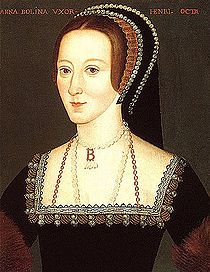 The English Monarchy ruled with fear by determining your place or “station” in daily life. In order to rise above your borne station or “class” in life you had to be in the favor of the “court” and the ruling monarchy. Anyone in the “court” fiercely protected themselves and any “favor” they may have gained from King Henry VIII at the time. Our fascination with Anne Boleyn begins here, I believe, because she was able to move herself up through the court and into the favorable eye of Henry. As she is moving up, the “Court” supports her, for everyone loves an “underdog” and wants to come along for the ride and any favorable “scraps” they can grab. Yet, once the “underdog” achieves its higher ground, everyone can’t wait to “knock” them back down to their “rightful” place amongst us.
The English Monarchy ruled with fear by determining your place or “station” in daily life. In order to rise above your borne station or “class” in life you had to be in the favor of the “court” and the ruling monarchy. Anyone in the “court” fiercely protected themselves and any “favor” they may have gained from King Henry VIII at the time. Our fascination with Anne Boleyn begins here, I believe, because she was able to move herself up through the court and into the favorable eye of Henry. As she is moving up, the “Court” supports her, for everyone loves an “underdog” and wants to come along for the ride and any favorable “scraps” they can grab. Yet, once the “underdog” achieves its higher ground, everyone can’t wait to “knock” them back down to their “rightful” place amongst us.
With education and technology our society has truly evolved, yet, even today you see the same “human” behavior. Daily, we all “tune-in” to all forms of media to catch any hype on individuals whom achieve greatness in all avenues of life; sports, music, business, etc. We love and encourage them all on the way “up”, admiring their glorious achievements. Then along with the paparazzi, aka the “court”, we crouch in the bushes and wait to capture their “fall” so that we no longer feel “inferior”.
Anne Boleyn’s second attraction was as basic as they come…her sex. Anne was keen to the ways of the world in the “court” and in the “bedroom” after living in the French court with her sister, Mary. Unlike her sister and, the many other prior mistresses of Henry, Anne knew her only “leverage” was her “virginity”. Anne’s existence in the French court taught her that her virtue was priceless…so long as she kept it intact. I believe that she learned that men in power need to be “stimulated” or, they loose interest very fast. Anne “titillated” Henry all the way to the alter and secured the future of her daughter, Elizabeth, as a legitimate heir to the thrown.
Some say that Anne helped to reform the Church of England…I’m not sure if she “knowingly” did this or if she did what ever she had to do at the time, with the only “tools” she had to use to survive at this time when it was truly a man’s world. Which to me is why I’m so fascinated with her story, she was a survivor!
By Roberta Philbrick
The next entry is by Heather Rieseck and is a great article – I must add some Team Anne T-shirts to our Cafe Press store!
The Mystery of the Fascination with Anne Boleyn
The interest in historical fiction and especially the Tudor court has climbed to a fever pitch in recent years. People have developed a passion for their favorite queen of Henry VIII and debate with each other as to who was the best queen and for what reasons; I am surprised that I haven’t seen any Team Anne or Team Katherine shirts yet (reminiscent of Team Aniston and Team Jolie)! Out of all of Henry’s queens, Anne Boleyn is frequently the most talked about and probably for good reason.
I think much of the fascination with Anne Boleyn begins with the way she pushed her way into Henry’s heart and would not settle for the role of Royal Mistress. She had a power and force to her that most women of the time would not even dare to think about. In fact, many women today probably envy her passion and the strength and resolve that she had. To that end, she can be seen as a role model. She was one of those rare women that fought hard for what they wanted, and actually succeeded, for awhile.
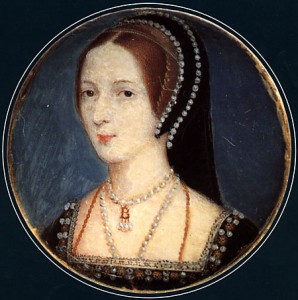 Anne also brought with her many changes to the court life. She helped bring about the shift in religious belief from the Catholic Church to the Church of England. She was able to convince Henry to leave his wife of many years, Katherine of Aragon, that he cared very much for. She had to be smart and knowledgeable of court politics to be able to bring about these massive changes that no one had considered possible. She also did not come from a royal blood line, so the fact that she was able to ascend to the position of Queen of England was quite an incredible feat.
Anne also brought with her many changes to the court life. She helped bring about the shift in religious belief from the Catholic Church to the Church of England. She was able to convince Henry to leave his wife of many years, Katherine of Aragon, that he cared very much for. She had to be smart and knowledgeable of court politics to be able to bring about these massive changes that no one had considered possible. She also did not come from a royal blood line, so the fact that she was able to ascend to the position of Queen of England was quite an incredible feat.
For other people the fascination with Anne Boleyn resides in the manner in which she died. You cannot deny the fact that when children are in school, hearing about a person being beheaded (without knowing all of the events that led up to the event) evokes the response “cool”! Many people could not tell you how many wives Henry had or what their names are but they can tell you that Anne Boleyn lost her head. This just goes to show how her story has permeated into culture. Her cause is also interesting to many who are interested in the reason for her cruel death.
I also think that on a more dramatic note, her story as well as that of the Tudor period in general, makes for good entertainment. There is enough to fill many books about as well as television shows and movies. There is a sweet love story at the heart that brings in viewers, as well as drama and even some blood – a little something for everyone. It is also a beautiful time period of clothing, pageantry, dancing, and parties – escapism for people today who do not get the chance to experience these types of things.
I think the interest in Anne Boleyn resides of two levels. The first level is the pure intrigue of the story for people who are not very familiar with the time period. The second level is of those who are more interested in the actual person and life that she led. Regardless of what reason people are interested in Anne Boleyn, her story is continuing to be passed through the years and she is living on in the minds and hearts of many people.
By Heather Rieseck
In this entry, Sabrina Padilla talks of the different views that people hold of Anne – icon and anti-Christ – brilliant!
Why we still discuss Anne Boleyn
The second queen of Henry VIII was one of the most controversial queens England has ever known.
In a time where women were the property of men with really no independence, she took it upon herself to become independent and break the rules of Tudor society. She embraced her intelligence and wit, and used them to her advantage. Most of us know that her bold attitude is what first attracted Henry to her. She broke the rules of what women were supposed to be and did not apologize for it.
She became an icon to some of us, and to others she was the anti-christ. Catherine of Aragon said she was the “Scandal of Christendom.” Reformers looked to her as their savior, endorsing those who wanted Rome out of England. Either you loved her, or hated her. Her enemies set out to destroy her, simply because they were afraid of her, of what she could do, and how fast it could be done.
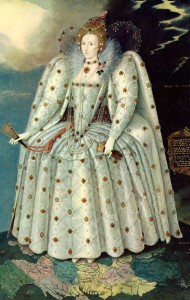 Anne Boleyn gave birth to the greatest Queen of England, Elizabeth I. She took more interest in her child than most were comfortable with. She tried to keep Elizabeth with her as much as possible. She understood that her daughter had a place in the world, and she made sure she was treated accordingly. She stood up for her daughter’s interests, and would not take less than what her daughter deserved. Those of us who have read about Elizabeth I can see that a lot of her strength came from her mother.
Anne Boleyn gave birth to the greatest Queen of England, Elizabeth I. She took more interest in her child than most were comfortable with. She tried to keep Elizabeth with her as much as possible. She understood that her daughter had a place in the world, and she made sure she was treated accordingly. She stood up for her daughter’s interests, and would not take less than what her daughter deserved. Those of us who have read about Elizabeth I can see that a lot of her strength came from her mother.
Her demise is brought up frequently due to the inconsistencies. How could a woman who was surrounded by people all day, have numerous affairs with men in her chambers? Henry was falling in love with another woman, and knew he had no legal grounds to divorce her. I’m sure if she had a son, her place would be set for life. But she did not. He used that excuse to start her downfall. After her argument with Cromwell, the wheels went into motion.
She was arrested in the beginning of May, and sent to the Tower. When you read the accounts from Master Kingston, you can almost see how she was when she went in. She knew she may have displeased the King by not curbing her spirited independence, but isn’t that why he fell in love with her? She went to trial with her brother and those accused of adultery with her. Instead of pleading guilty, they maintained their innocence. Those who tried them were already sentencing them to their deaths, their trials basically a way for them to look like they were handling themselves properly. When she went on trial, she stood up to those who wanted to accuse her. Even though she tore their case to shreds, they still condemned her to die. The king wanted her dead, so they made sure that she was proven guilty.
She held herself up until the end, and was not afraid to die. In her final speech to those who watched her execution, she did not admit her guilt. When she stood there, asking those to not try to take her case, but to just pray for her, we imagine that her voice did not falter. She would never see her daughter again, or any of those that she loved. All she had left was herself.
Her spirit would not be broken even at this truly tragic time in her life. With all that has been said about her, with all that she had done in her short life, she never looked back, nor did she give up. Like those before her, those who did not enjoy her praises, or were dead set on destroying her, they vilified her. But for those of us who want to see her for who she really was, can see that she was a strong, intelligent, independent woman in a time that did not give that up for anything. We learn that we shouldn’t be afraid of life, but take it by the horns and just run.
We are fascinated by this great woman because she shows us that not all of us have to be ashamed of whom we are. Even by today’s standards, women with intelligence and independence are still frowned upon on some level. For those of us who have been frowned upon because of those qualities, sometimes look for those who stood up for themselves and never looked back. We hear her story, her fascinating yet sad story, and embrace it.
By Sabrina Padilla
The following article by Ann O’Neill is an excellent examination of why this woman is still affecting us nearly 500 years later:-
Anne Boleyn
Nearly five hundred years have passed. Why should the cries of any one woman echo more forcefully than the cries of so many others? Was she in fact more important? Was her situation perhaps more tragic than others? Not necessarily, of course. History, both written and unwritten, is full of stories of women the world over who were mistreated, maligned, and even murdered. I believe though that as tragic as Anne Boleyn’s story was, it is her bravery, her intelligence, her charm and her dignity as Queen that draws us to her story. She was more than just a footnote in the history texts, more than just number two on an infamous list of six. She was literally and figuratively a renaissance woman, who lived and went to her death in a manner of her own choosing. Some called her scheming, conniving. Others recognized her quick mind, and her shrewd ability to assess situations ranging from matters of state to those of a more personal nature. She was inimitably herself, and could be nothing more, nothing less. And if that was her undoing, it was also that which has carried her story down through centuries.
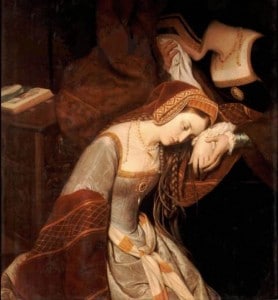 If Henry thought to erase the memory of Anna Regina with one stroke of a master swordsman, he couldn’t have been more wrong. Anne Boleyn lived on far beyond the solemn knells that tolled on that day in May so long ago. Indeed, and apparently as per usual, Henry Rex underestimated Anne. She did not give in to hysteria – a remarkable feat in itself – any more than she had given in to Henry’s desire when their strange and doomed dance first began. She went to her death with the same calmness and dignity by which she had lived. She made no attempt to plead her own case, to rebuke those who had gleefully awaited her downfall. She praised Henry as a good and gentle lord, and offered her own soul to Christ. How many dark hours did she spend contemplating her inevitable demise? The Tower was as cold as court, and the one man who could have made it different with but a word had turned toward another as once he had turned to her. She was ultimately alone, and left this world as she had travelled through it, as a lady. And ultimately, last impressions – as first impressions do – stay with us. She left us not as a shrew or a witch, but a quietly dignified woman, who even unto the end would not speak ill of the King.
If Henry thought to erase the memory of Anna Regina with one stroke of a master swordsman, he couldn’t have been more wrong. Anne Boleyn lived on far beyond the solemn knells that tolled on that day in May so long ago. Indeed, and apparently as per usual, Henry Rex underestimated Anne. She did not give in to hysteria – a remarkable feat in itself – any more than she had given in to Henry’s desire when their strange and doomed dance first began. She went to her death with the same calmness and dignity by which she had lived. She made no attempt to plead her own case, to rebuke those who had gleefully awaited her downfall. She praised Henry as a good and gentle lord, and offered her own soul to Christ. How many dark hours did she spend contemplating her inevitable demise? The Tower was as cold as court, and the one man who could have made it different with but a word had turned toward another as once he had turned to her. She was ultimately alone, and left this world as she had travelled through it, as a lady. And ultimately, last impressions – as first impressions do – stay with us. She left us not as a shrew or a witch, but a quietly dignified woman, who even unto the end would not speak ill of the King.
The rumours abound – witch, incest, potions, poisons. She had a sixth finger! Her eyes – enchanted! The truth was far less dramatic. She was lovely, slender, with a poise learned in that most sophisticated of courts (to Henry’s eternal chagrin) – France. She was not stunning, and airbrushing did not exist – although Holbein always gave it his best shot. As is the case with so many women however, where physical beauty ended, Anne’s personality began and that was more arresting than all of her features combined. She was witty, graceful, and remarkably skilled at the cat and mouse back and forth game of flirtation. She had intelligence and wasn’t afraid to use it – a trait that did not win her many male supporters. Frankly, even the men weren’t always required to use their intelligence. They were used to business as usual based on tradition and occasionally whim. Imagine their distress when confronted with a woman who could – and would! – speak. And worse – a woman who held captive the attention of the most powerful man in England. To many, that in itself would have been cause to plot Anne’s downfall.
Centuries later and an ocean away, I wonder often about her sad story. Some would say that in the end, she got only what she deserved – a fitting end for her plotting and scheming. I rather think that Anne was well-aware of the risks involved not only with loving a King, but with being a sharp-witted woman who was unafraid of her own power. And while I hope that she has long since been resting in a place of serenity, we remember her still as she was. Long Live The Queen!
By Ann O’Neill
I have to agree with Amy Li in the next article when she talks of Anne’s mystery and the puzzle we want to piece together – great article!
Anne Boleyn
Perhaps it is part of human nature to find fascination with the unknown, to explore the fiery depths of the past, and the future—whatever aspects of life that man does not already know of. Why else would scholars study the past? To learn from it? To prevent themselves and others from repeating it? While those may be driving forces to study the past, a much greater desire to understand the mysteries of events many know not of overshadows other reasons.
Such is most likely the reason why modern men are so drawn to the queens and courtiers of centuries past, among them Anne Boleyn, the second wife of King Henry VIII and the mother of Elizabeth I. Lady Anne was a witch, traitor, heretic, and perhaps one of the most influential woman in the history of England. She was not beautiful, yet she captivated the heart of almost every man at court, including the king himself, regardless.
As the daughter of a wealthy noble man, Anne received an education at Burgundy, under the Regent Margaret. Through the guidance and leadership of this noble woman, Anne not only learned to read, write and speak French perfectly, but also became very fluent in Latin as well. She was taught to sing, dance and entertain. She attended lavish courtly events at one of the most sophisticated courts of the time period (Ives 19-22). Upon her return to England, these intellectual opportunities gave Anne the upper hand at court, allowing her to stand out among the other less educated ladies of a patriarchal English society.
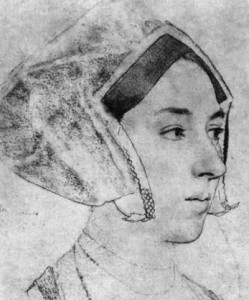 Much of Anne Boleyn’s charm lies within her mystery. For many years, historians have attempted to understand the truth about her. Yet, putting the puzzle pieces together is not an easy task, as many documents related to Anne were destroyed after her downfall. With the destruction of these documents, various rumors about her circulated, claiming she had a large mole on her neck and a sixth finger, further obstructing the process. The lack of details about her life and death only draw people more to her. As man often strives to seek what they know not of, the lure of Anne Boleyn is within the depths of her mysterious life.
Much of Anne Boleyn’s charm lies within her mystery. For many years, historians have attempted to understand the truth about her. Yet, putting the puzzle pieces together is not an easy task, as many documents related to Anne were destroyed after her downfall. With the destruction of these documents, various rumors about her circulated, claiming she had a large mole on her neck and a sixth finger, further obstructing the process. The lack of details about her life and death only draw people more to her. As man often strives to seek what they know not of, the lure of Anne Boleyn is within the depths of her mysterious life.
The little known facts about her only raise further questions regarding her personality and appearance. Francesco Saunto, a Venetian Diplomat said of Anne:
“Madame Anne is not of the handsomest women in the world; she is of middling stature, swarthy complexion, long neck, wide mouth, a bosom not much raised and eyes which are black and beautiful (Denny 20).”
This is to say that Anne may not have been the most beautiful woman at the English Court, but a haunting quality drew many men to her.
Unlike her elder sister Mary, Anne refused to be the king’s mistress. Although he wrote her numerous letters and courted her for nearly seven years, promising to make her his one and only mistress, she still refused. She had her own dignity and sense of self-pride. Anne Boleyn knew what she wanted. Though the king tried to woo her for years, she would not succumb to his charm, until he made her his queen, attesting to her ambitious spirit.
Although she had many enemies, who called her a witch, a traitor and a heretic, her high level of education, impeccable fashion sense and immaculate courtly manners prove her to be an avant-garde woman way beyond her time, regardless of the mysteries and uncertainties that shroud her true character.
Works Cited
Denny, Joanna. Anne Boleyn A New Life for England’s Tragic Queen.
Ives, Eric W. The Life and Death of Anne Boleyn.
By Amy Li
Janette missed the competition but wrote a wonderful article about why she is fascinated by Anne.
Anne Boleyn
Anne Boleyn is still talked about today because she’s the most controversial of all Henry’s wives. I, like you all, am totally obsessed with her and have been for the last 35 years. I think she was the prettiest of all Henry’s wives. She exuded sex appeal, mystery, magnetism and she had eyes that captivated the onlooker, taking them tantalisingly into her self, which, although she was not thought a beauty, made her seem so, she was also petite.
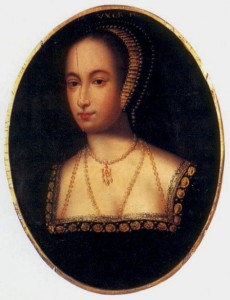 She had lived at the French court of Francis I from a fairly young age and so learned their etiquette, mannerisms and dress, which she bought to the English court. This style had not been seen before, so she would have stood out against the English fashion. She could speak French fluently so when she spoke in English her voice would have the French accent, which at that time, when people where not travelled, would make her even more attractive and seductive. She was an incorrigible flirt and men flocked to her, and women were jealous of her. This in itself made her unpopular.
She had lived at the French court of Francis I from a fairly young age and so learned their etiquette, mannerisms and dress, which she bought to the English court. This style had not been seen before, so she would have stood out against the English fashion. She could speak French fluently so when she spoke in English her voice would have the French accent, which at that time, when people where not travelled, would make her even more attractive and seductive. She was an incorrigible flirt and men flocked to her, and women were jealous of her. This in itself made her unpopular.
She did not want to be involved with Henry at first but when she could see there was no way he was going to let his prey go and to say ‘NO’ to the king was unheard of, her fate was sealed. The power she held over Henry by keeping him celibate and at arms length for some seven years, making sure she did not go the way of her sister, who was
Henry’s mistress for many years before Anne came to court, and who now was cast aside after he had had his fill of her, had gone to Anne’s head. No one had ever refused his sexual advances before. So I think we can all appreciate, sympathise and understand to a certain degree her predicament.
She was intelligent, musically sound and well educated, more so than almost every other women bar a few, and her wit was exceptional, very quick with an answer for every comment made to her, which also made her amusing to be around. But she was terribly ambitious. Henry felt let down by her promise to present him with a healthy male
heir and not providing to do so. He was getting tired of her tantrums, jealousies, hysterics, and arrogance and told her ‘she should turn a blind eye as her betters had done before her’ And he could ‘drag her down as fast as he had elevated her‘. Henry and his councillors believed England must have a male heir, and so did not give up this pursuit of achieving it.
Anne had asked Henry numerous times to have Katherine and her daughter executed as she felt this was God’s way of saying that until they where both out of the equation, dead, she would not conceive a male heir. She knew her life depended on this. But I think ultimately she thought she would be treated like Katherine had been, exiled, but she
failed to remember, Katherine WAS a true princess in her own right and Anne after all, was not.
Anne had moles on her person and a sixth nail on her small finger which she tried to conceal with the French fashion of long flowing sleeves. This also ultimately went against her, she was seen as a witch, having beguiled Henry by witchcraft. What once had seemed attractive to him in this ‘different’ woman now repulsed him. He had said ‘her French way of love making now appalled him’! What ever that meant? He was acquainted with Jane Seymour and fell in love by her veneer of meek, gentleness, because underneath, she too was ambitious like Anne but knew when and where to use it. Anne could not live, she had to be got rid of. Henry wanted to make sure any future sons he had by Jane, were legitimate.
Anne was brave at her trial and execution, she had come to terms with her imminent death. Henry failed to supply a coffin for her, so her headless body lay on the scaffold covered in flies until someone put her in an arrow box!
In the end their daughter Elizabeth I reigned some fifty or sixty years.
By Janette Parlett